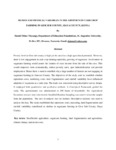HUMAN AND PHYSICAL VARIABLES IN THE ADOPTION OF CASH CROP FARMING IN GEM SUB COUNTY, SIAYA COUNTY, KENYA
Abstract
Poverty level in Gem sub-county is high yet the area has a high agricultural potential. However,
there is low engagement in cash crop farming especially, growing of sugarcane. Involvement in
sugarcane farming would assure the farmers of extra income from the sale of the crop. This
would empower them economically, reduce poverty rates, spur industrialization and provide
employment. Hence there is need to establish why a large number of farmers are not engaging in
sugarcane farming in Gem-sub County. The objectives of the study were to: establish whether
operations costs, marketing costs, land fragmentation and rainfall variability have influenced
adoption of sugarcane as a cash crop. The study was conducted using descriptive survey design.
It employed both quantitative and qualitative methods. A Conceptual Framework guided the
study. The questionnaire was administered to 300 heads of households. Six Agricultural
Extension workers were interviewed. Stratified Random Sampling was used to select the sample
from the population. The unit of analysis was the farmers. Descriptive statistics was used to
analyze the data. The study established that operations costs, marketing, land fragmentation and
rainfall variability contributed to decline in sugarcane farming in Gem Sub County, Siaya
County.

